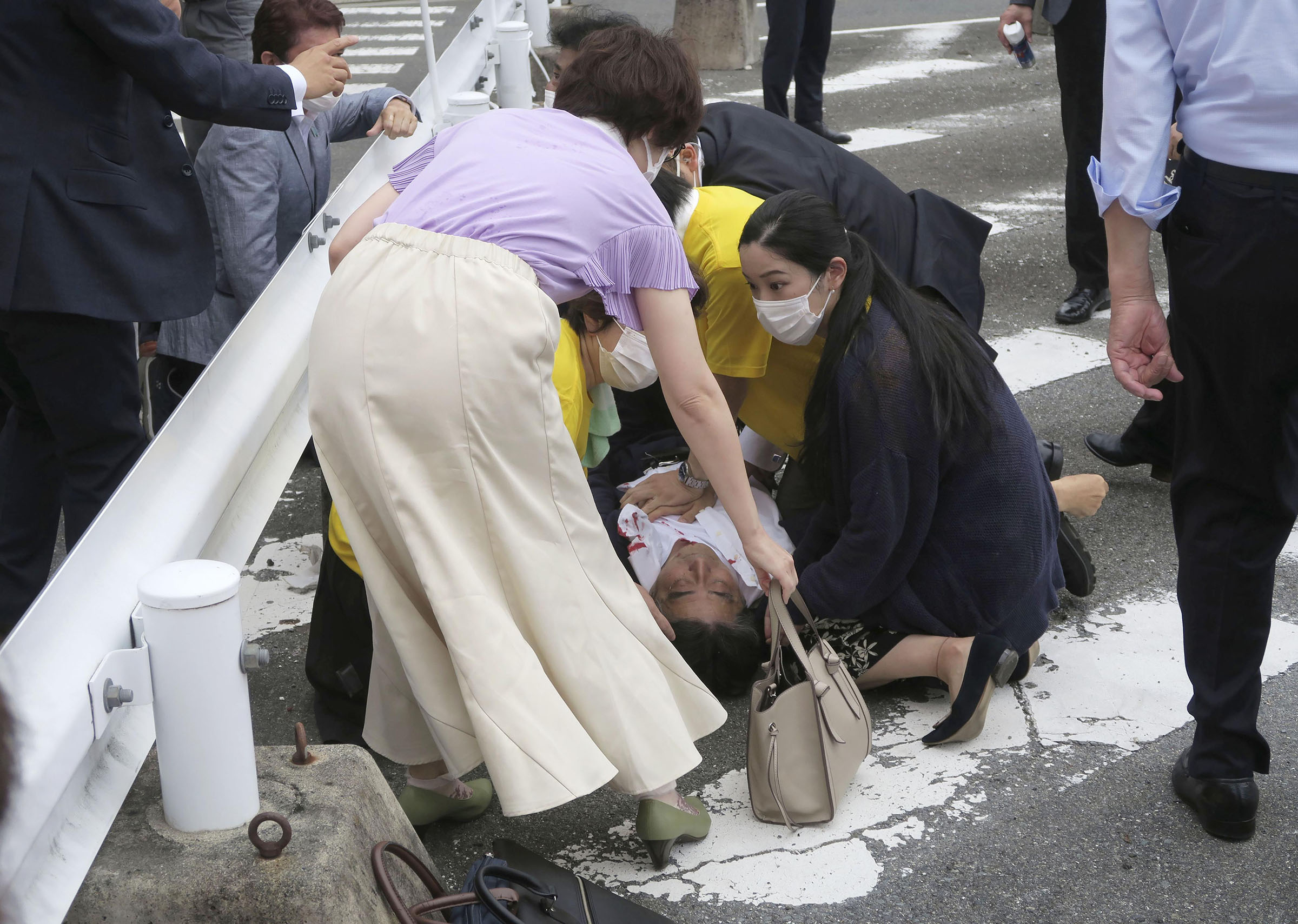Former Japanese Prime Minister Shinzo Abe has died, after he was shot on Friday in the western Japanese city of Nara. He was 67.
Hospital officials at the Nara Medical University told local reporters after the shooting that the former Japanese leader arrived at 12:20 p.m. without any vital signs. He reportedly lost a lot of blood from his gunshot wounds. Hospital authorities did a blood transfusion and tried to resuscitate him, before he was declared dead at 5:03 p.m.
Read more: How the World Is Reacting to Shinzo Abe’s Death
Abe was shot while campaigning for the ruling Liberal Democratic Party (LDP) ahead of elections in Japan’s upper parliament on Sunday. A man was apprehended at the scene after apparently firing two shots with a weapon that appeared to be a makeshift firearm.
Current Prime Minister Fumio Kishida condemned the attack in the “harshest words possible.”
Abe, Japan’s longest serving prime minister since World War II and perhaps the most prominent politician in the world’s third-largest economy, held office from 2006 to 2007 and again from 2012 to 2020. He resigned in 2020, citing health issues.
Here’s what we know so far.
What happened?

In video footage circulating on social media, Abe is speaking in front of a crowd of a few hundred people near the Yamato-Sadaiji train station in Nara when a loud bang is heard from behind him and a cloud of apparent gun smoke can be seen. Abe does not move after the first shot, but as the camera pans away and people begin to scream, a second gunshot is heard.
A reporter for NHK said she heard what sounded like two gunshots, and saw Abe bleeding. Abe was making a stump speech on the street ahead of July 10 elections for the upper house of parliament.
Nara is the landlocked capital of Nara Prefecture—located 235 miles northeast of Tokyo.
The suspect has been identified as a resident of Nara prefecture in his early 40s, according to NHK. Japanese media also cited defense officials who said that he was a former member of the Japan Maritime Self Defense Forces. The weapon used, shown by Japanese broadcasters, appears to be improvised or homemade. Police told NHK that the suspect claimed he was “dissatisfied” with Abe and “intended to kill him.”
Tobias Harris, a longtime Japan watcher based in Washington, D.C. who wrote a biography about Abe, tells TIME that in Japan, “the distance between politicians and the public is very close.”
“He’s a high-profile former prime minister, so he’s got more security than most, but he’s not kind of flanked by the kind of security you would see for a comparable American official,” says Harris.
Why is Shinzo Abe so important to Japanese politics?
It’s hard to overstate Abe’s power and influence in Japanese politics—even after he resigned as prime minister.
Some prime ministers recede from public life after resigning, but that was not Abe’s path.
“He is the head of the largest faction, the head of the largest ideological block of his party. And he’s been trying to set the agenda in the way that even Kishida has struggled to do,” says Harris.
He ushered in “Abenomics,” a set of aggressive monetary and fiscal policies aimed at pulling Japan out of economic stagnation. The success of Abenomics in its early years raised Abe’s international reputation.
Read more: Shinzo Abe Rewrote Japan’s Place in the World. And Remained a Power Broker Until the Very End
He campaigned for rewriting Japan’s pacifist constitution so that it would allow the nation of 126 million people to come to the aid of allies. He also oversaw an expansion of the country’s military—known as the Self-Defense Forces—and a more aggressive response to China’s growing power in the region.
He also developed Japan’s foreign relations. In his first term, Abe formalized a four-way alliance with India, Australia, and the U.S.—aimed at improving maritime security in the Indo-Pacific region to counterbalance China. Despite this, Abe still tried to improve chilly relations with China, and also kept strong ties with then-U.S. President Donald Trump.
Abe also led the dominant LDP through a series of wins at the National Diet, Japan’s legislature.
However, he failed to push through with some of his promises, including amendments to Japan’s pacifist post-war constitution, a resolution to the issue of North Korea’s alleged abduction of Japanese from the 1960s to the 1980s, and a territorial dispute with Russia. When he resigned as prime minister, Abe was also beset by a slew of corruption scandals and low public approval over how his cabinet handled Japan’s coronavirus epidemic.
His wife, Akie Abe, was linked to a cronyism scandal related to the sale of state-owned land to a private school operator. Abe’s camp was also accused of illegally paying millions of yen to cover dinner receptions for his supporters between 2015 and 2019.
Japan has very strict gun laws and little crime
Japan is one of the world’s safest places. It’s extremely difficult to get a firearm in Japan, which is often cited for the country’s low gun death rate.
Only certain types of guns are allowed in Japan, including shotguns and air guns, for purposes like hunting. But even before obtaining these, gun purchasers need to pass a series of written, mental, and drug tests, and a rigorous background check.
In 2017, there were only 22 shootings in the country.
—With reporting by Michael Zennie
More Must-Reads from TIME
- Cybersecurity Experts Are Sounding the Alarm on DOGE
- Meet the 2025 Women of the Year
- The Harsh Truth About Disability Inclusion
- Why Do More Young Adults Have Cancer?
- Colman Domingo Leads With Radical Love
- How to Get Better at Doing Things Alone
- Michelle Zauner Stares Down the Darkness
Write to Amy Gunia at amy.gunia@time.com